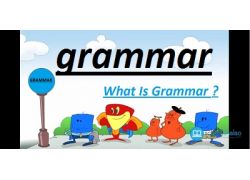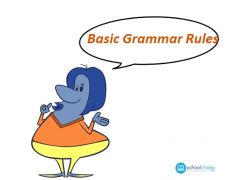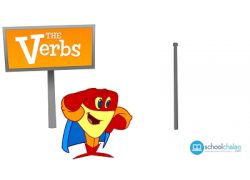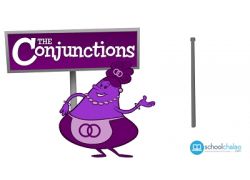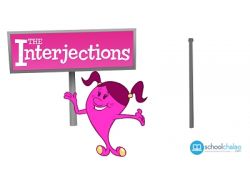Tutorial Library
Learning Point
English Grammar Terms
This glossary of English grammar terms relates to the English language. Some terms here may have additional or extended meanings when applied to other languages. For example, "case" in some languages applies to pronouns and nouns. In English, nouns do not have case and therefore no reference to nouns is made in its definition here.
Term |
Definition |
|
Active voice |
One of two voices in English; a direct form of expression where the subject performs or "acts" the verb; see also passive voice. |
|
Adjective |
Part of speech that typically describes or "modifies" a noun. |
|
Adjective clause |
Seldom-used term for relative clause. |
|
Adjunct |
Word or phrase that adds information to a sentence and that can be removed from the sentence without making the sentence ungrammatical. |
|
Adverb |
Word that modifies a verb, an adjective or another adverb. |
|
Adverbial clause |
Dependent clause that acts like an adverb and indicates such things as time, place or reason |
|
Affirmative |
Statement that expresses (or claims to express) a truth or "yes" meaning; opposite of negative. |
|
Affix |
Language unit (morpheme) that occurs before or after (or sometimes within) the root or stem of a word. |
|
Agreement |
Logical (in a grammatical sense) links between words based on tense, case or number. |
|
Antecedent |
Word, phrase or clause that is replaced by a pronoun (or other substitute) when mentioned subsequently (in the same sentence or later). |
|
Appositive |
Noun phrase that re-identifies or describes its neighbouring noun. |
|
Article |
Determiner that introduces a noun phrase as definite (the) or indefinite (a/an) |
|
Aspect |
Feature of some verb forms that relates to duration or completion of time; verbs can have no aspect (simple), or can have continuous or progressive aspect (expressing duration), or have perfect or perfective aspect (expressing completion)
|
|
Auxiliary verb |
Verb used with the main verb to help indicate something such as tense or voice. |
|
Bare infinitive |
Unmarked form of the verb (no indication of tense, mood, person, or aspect) without the particle "to"; typically used after modal auxiliary verbs; see also infinitive. |
|
Base form |
Basic form of a verb before conjugation into tenses etc. |
|
Case |
Form of a pronoun based on its relationship to other words in the sentence; case can be subjective, objective or possessive. |
|
Causative verb |
Verb that causes things to happen such as "make", "get" and "have"; the subject does not perform the action but is indirectly responsible for it. |
|
Clause |
Group of words containing a subject and its verb. |
|
Comparative, |
Form of an adjective or adverb made with "-er" or "more" that is used to show differences or similarities between two things (not three or more things) |
|
Complement |
Part of a sentence that completes or adds meaning to the predicate. |
|
Compound noun |
Noun that is made up of more than one word; can be one word, or hyphenated, or separated by a space. |
|
Compound sentence |
Sentence with at least two independent clauses; usually joined by a conjunction. |
|
Concord |
Another term for agreement. |
|
Conditional |
Structure in English where one action depends On another ("if-then" or "then-if" structure); most common are 1st, 2nd, and 3rd conditionals. |
|
Conjugate |
To show the different forms of a verb according to voice, mood, tense, number and person; conjugation is quite simple in English compared to many other languages. |
|
Conjunction |
Word that joins or connects two parts of a sentence. |
|
Content word |
Word that has meaning in a sentence, such as a verb or noun (as opposed to a structure word, such as pronoun or auxiliary verb); content words are stressed in speech. |
|
Continuous |
Verb form (specifically an aspect) indicating actions that are in progress or continuing over a given time period (can be past, present or future); formed with "BE" + "VERB-ing" |
|
Contraction |
Shortening of two (or more) words into one. |
|
Countable noun |
Thing that you can count, such as apple, pen, tree (see uncountable noun). |
|
Dangling participle |
Illogical structure that occurs in a sentence when a writer intends to modify one thing but the reader attaches it to another. |
|
Declarative sentence |
Sentence type typically used to make a statement (as opposed to a question or command). |
|
Defining relative clause |
Relative clause that contains information required for the understanding of the sentence; not set off with commas; see also non-defining clause. |
|
Demonstrative pronoun |
Pronoun or determiner that indicates closeness to (this/these) or distance from (that/those) the Speaker. |
|
Dependent clause |
Part of a sentence that contains a subject and a verb but does not form a complete thought and cannot stand on its own; see also independent clause. |
|
Determiner |
Word such as an article or a possessive adjective or other adjective that typically comes at the beginning of noun phrases. |
|
Direct speech |
Saying what someone said by using their exact words; see also indirect speech. |
|
Direct object |
Noun phrase in a sentence that directly receives the action of the verb; see also indirect object. |
|
Embedded question |
Question that is not in normal question form with a question mark; it occurs within another statement or question and generally follows statement structure. |
|
Finite verb |
Verb form that has a specific tense, number and person. |
|
First conditional |
"If-then" conditional structure used for future actions or events that are seen as realistic possibilities. |
|
Fragment |
Incomplete piece of a sentence used alone as a complete sentence; a fragment does not contain a complete thought; fragments are common in normal speech but unusual (inappropriate) in formal writing. |
|
Function |
Purpose or "job" of a word form or element in a sentence. |
|
Future continuous |
Tense used to describe things that will happen in the future at a particular time; formed with WILL + BE + VERB-ing. |
|
Future perfect |
Tense used to express the past in the future; formed with WILL HAVE + VERB-ed. |
|
Future perfect continuous |
Tense used to show that something will be ongoing until a certain time in the future; formed with WILL HAVE BEEN + VERB-ing. |
|
Future simple |
Tense used to describe something that hasn't happened yet such as a prediction or a sudden decision; formed with WILL + BASE VERB. |
|
Genitive case |
Case expressing relationship between nouns (possession, origin, composition etc). |
|
Gerund |
Noun form of a verb, formed with VERB-ing. |
|
Gradable adjective |
Adjective that can vary in intensity or grade when paired with a grading adverb ; see also non-gradable adjective. |
|
Grading adverb |
Adverb that can modify the intensity or grade of a gradable adjective. |
|
Hanging participle |
Another term for dangling participle. |
|
Helping verb |
Another term for auxiliary verb. |
|
Imperative |
Form of verb used when giving a command; formed with BASE VERB only |
|
Indefinite pronoun |
Pronoun does not refer to any specific person, thing or amount. It is vague and "not definite". |
|
Independent clause |
Group of a word that expresses a complete thought and can stand alone as a sentence; see also dependent clause |
|
Indirect object |
Noun phrase representing the person or thing indirectly affected by the action of the verb; see also direct object |
|
Indirect question |
Another term for embedded question |
|
Indirect speech |
Saying what someone said without using their exact words; see direct speech |
|
Infinitive |
Base form of a verb preceded by "to"**; see also bare infinitive |
|
Inflection |
change in word form to indicate grammatical meaning |
|
Interjection |
Common word that expresses emotion but has no grammatical value; can often be used alone and is often followed by an exclamation mark |
|
Interrogative |
(Formal) sentence type (typically inverted) normally used when asking a question |
|
Interrogative pronoun |
Pronoun that asks a question. |
|
Intransitive verb |
Verb that does not take a direct object; see also transitive verb |
|
Inversion |
Any reversal of the normal word order, especially placing the auxiliary verb before the subject; used in a variety of ways, as in question formation, conditional clauses and agreement or disagreement |
|
Irregular verb |
Verb that has a different ending for past tense and past participle forms than the regular "-ed"; see also regular verb |
|
Lexicon, lexis |
All of the words and word forms in a language with meaning or function |
|
Lexical verb |
another term for main verb |
|
Linking verb |
Verbs that connect the subject to more information (but do not indicate action), such as "be" or "seem" |
|
Main clause |
Another term for independent clause |
|
Main verb |
Any verb in a sentence that is not an auxiliary verb; a main verb has meaning on its own |
|
Modal verb |
Auxiliary verb such as can, could, must, should etc; paired with the bare infinitive of a verb |
|
Modifier |
Word or phrase that modifies and limits the meaning of another word |
|
Mood |
Sentence type that indicates the speaker's view towards the degree of reality of what is being said, for example subjunctive, indicative, imperative |
|
Morpheme |
Unit of language with meaning; differs from "word" because some cannot stand alone |
|
Multi-word verb |
Verb that consists of a basic verb + another word or words (preposition and/or adverb) |
|
Negative |
Form which changes a "yes" meaning to a "no" meaning; opposite of affirmative |
|
Nominative case |
Another term for subjective case |
|
Non-defining relative clause |
Relative clause that adds information but is not completely necessary; set off from the sentence with a comma or commas; see defining relative clause |
|
Non-gradable adjective |
Adjective that has a fixed quality or intensity and cannot be paired with a grading adverb; see also gradable adjective |
|
Non-restrictive relative clause |
Another term for non-defining relative clause |
|
Noun |
Part of speech that names a person, place, thing, quality, quantity or concept; see also proper noun and compound noun |
|
Noun clause |
Clause that takes the place of a noun and cannot stand on its own; often introduced with words such as "that, who or whoever" |
|
Noun phrase (NP) |
Any word or group of words based on a noun or pronoun that can function in a sentence as a subject, object or prepositional object; can be one word or many words; can be very simple or very complex |
|
Number |
Change of word form indicating one person or thing (singular) or more than one person or thing (plural) |
|
Object |
Thing or person affected by the verb; see also direct object and indirect object |
|
Objective case |
case form of a pronoun indicating an object |
|
Part of speech |
One of the classes into which words are divided according to their function in a sentence |
|
Participle |
Verb form that can be used as an adjective or a noun; see past participle, present participle |
|
Passive voice |
One of two voices in English; an indirect form of expression in which the subject receives the action; see also active voice |
|
Past tense |
Tense used to talk about an action, event or situation that occurred and was completed in the past |
|
Past continuous |
Tense often used to describe an interrupted action in the past; formed with WAS/WERE + VERB-ing |
|
Past perfect |
Tense that refers to the past in the past; formed with HAD + VERB-ed |
|
Past perfect continuous |
Tense that refers to action that happened in the past and continued to a certain point in the past; formed with HAD BEEN + VERB-ing |
|
Past participle |
Verb form (V3) - usually made by adding "-ed" to the base verb - typically used in perfect and passive tenses, and sometimes as an adjective |
|
Perfect |
Verb form (specifically an aspect); formed with HAVE/HAS + VERB-ed (present perfect) or HAD + VERB-ed (past perfect) |
|
Person |
Grammatical category that identifies people in a conversation; there are three persons: 1st person (pronouns I/me, we/us) is the speaker(s), 2nd person (pronoun you) is the listener(s), 3rd person (pronouns he/him, she/her, it, they/them) is everybody or everything else |
|
Personal pronoun |
Pronoun that indicates person |
|
Phrasal verb |
Multi-word verb formed with a verb + adverb |
|
Phrase |
Two or more words that have a single function and form part of a sentence; phrases can be noun, adjective, adverb, verb or prepositional |
|
Plural |
Of a noun or form indicating more than one person or thing; plural nouns are usually formed by adding "-s"; see also singular, number |
|
Position |
Grammatically correct placement of a word form in a phrase or sentence in relation to other word forms |
|
Positive |
Basic state of an adjective or adverb when it shows quality but not comparative or superlative |
|
Possessive adjective |
Adjective (also called "determiner") based on a pronoun: my, your, his, her, its, our, their |
|
Possessive case |
Case form of a pronoun indicating ownership or possession |
|
Possessive pronoun |
Pronoun that indicates ownership or possession |
|
Predicate |
One of the two main parts (subject and predicate) of a sentence; the predicate is the part that is not the subject |
|
Prefix |
Affix that occurs before the root or stem of a word |
|
Preposition |
Part of speech that typically comes before a noun phrase and shows some type of relationship between that noun phrase and another element (including relationships of time, location, purpose etc) |
|
Prepositional verb |
Multi-word verb that is formed with verb + preposition |
|
Present participle |
-Ing form of a verb (except when it is a gerund or verbal noun) |
|
Present simple (also called "simple present") |
Tense usually used to describe states and actions that are general, habitual or (with the verb "to be") true right now; formed with the basic verb (+ s for 3rd person singular) |
|
Present continuous (also called "present progressive") |
Tense used to describe action that is in process now, or a plan for the future; formed with BE + VERB-ing |
|
Present perfect |
Tense that connects the past and the present, typically used to express experience, change or a continuing situation; formed with HAVE + VERB-ed |
|
Present perfect continuous |
Tense used to describe an action that has recently stopped or an action continuing up to now; formed with HAVE + BEEN + VERB-ing |
|
Progressive |
Another term for continuous |
|
Pronoun |
Word that replaces a noun or noun phrase; there are several types including personal pronouns, relative pronouns and indefinite pronouns |
|
Proper noun |
Noun that is capitalized at all times and is the name of a person, place or thing |
|
Punctuation |
Standard marks such as commas, periods and question marks within a sentence |
|
Quantifier |
Determiner or pronoun that indicates quantity |
|
Question tag |
Final part of a tag question; mini-question at end of a tag question |
|
Question word |
another term for WH-word |
|
Reciprocal pronoun |
Pronoun that indicates that two or more subjects are acting mutually; there are two in English - each other, one another |
|
Reduced relative clause |
Construction similar to a relative clause, but containing a participle instead of a finite verb; this construction is possible only under certain circumstances |
|
Reflexive pronoun |
Pronoun ending in -self or -selves, used when the subject and object are the same, or when the subject needs emphasis |
|
Regular verb |
Verb that has "-ed" as the ending for past tense and past participle forms; see also irregular verb |
|
Relative adverb |
Adverb that introduces a relative clause; there are four in English: where, when, wherever, whenever; see also relative pronoun |
|
Relative clause |
Dependent clause that usually starts with a relative pronoun such as who or which, or relative adverb such as where |
|
Relative pronoun |
Pronoun that starts a relative clause; there are five in English: who, whom, whose, which, that; see also relative adverb |
|
Reported speech |
Another term for indirect speech |
|
Restrictive relative clause |
Another term for defining relative clause |
|
Second conditional |
"If-then" conditional structure used to talk about an unlikely possibility in the future |
|
Sentence |
Largest grammatical unit; a sentence must always include a subject (except for imperatives) and predicate; a written sentence starts with a capital letter and ends with a full stop/period (.), question mark (?) or exclamation mark (!); a sentence contains a complete thought such as a statement, question, request or command |
|
Series |
List of items in a sentence |
|
Singular |
Of a noun or form indicating exactly one person or thing; singular nouns are usually the simplest form of the noun (as found in a dictionary); see also plural, number |
|
Split infinitive |
Situation where a word or phrase comes between the particle "to" and the verb in an infinitive; considered poor construction by some |
|
Standard English (S.E.) |
"Normal" spelling, pronunciation and grammar that is used by educated native speakers of English |
|
Structure word |
Word that has no real meaning in a sentence, such as a pronoun or auxiliary verb (as opposed to a content word, such as verb or noun); structure words are not normally stressed in speech |
|
Subject |
One of the two main parts (subject and predicate) of a sentence; the subject is the part that is not the predicate; typically, the subject is the first noun phrase in a sentence and is what the rest of the sentence "is about" |
|
Subjective case |
Case form of a pronoun indicating a subject |
|
Subjunctive |
Fairly rare verb form typically used to talk about events that are not certain to happen, usually something that someone wants, hopes or imagines will happen; formed with BARE INFINITIVE (except past of "be") |
|
Subordinate clause |
Another term for dependent clause |
|
suffix |
Affix that occurs after the root or stem of a word |
|
Superlative, superlative adjective |
Adjective or adverb that describes the extreme degree of something |
|
SVO |
Subject-verb-object; a common word order where the subject is followed by the verb and then the object |
|
Syntax |
Sentence structure; the rules about sentence structure |
|
Tag question |
Special construction with statement that ends in a mini-question; the whole sentence is a tag question; the mini-question is a question tag; usually used to obtain confirmation. |
|
Tense |
Form of a verb that shows us when the action or state happens (past, present or future). Note that the name of a tense is not always a guide to when the action happens. The "present continuous tense", for example, can be used to talk about the present or the future. |
|
Third conditional |
"If-then" conditional structure used to talk about a possible event in the past that did not happen (and is therefore now impossible) |
|
Transitive verb |
Action verb that has a direct object (receiver of the action); see also intransitive verb. |
|
Uncountable nouns |
Thing that you cannot count, such as substances or concepts; see also countable nouns. |
|
Usage |
Way in which words and constructions are normally used in any particular language. |
|
V1, V2, V3 |
Referring to Verb 1, Verb 2, Verb 3 - being the base, past and past participle that students typically learn for irregular verbs. |
|
Verb |
Word that describes the subject's action or state and that we can change or conjugate based on tense and person. |
|
Voice |
Form of a verb that shows the relation of the subject to the action; there are two voices in English: active, passive |
|
WH-question |
Question using a WH-word and expecting an answer that is not "yes" or "no"; WH-questions are "open" questions; see also yes-no question |
|
WH-word |
Word that asks a WH-question; there are 7 WH-words: who, what, where, when, which, why, how |
|
Word order |
Order or sequence in which words occur within a sentence; basic word order for English is subject-verb-object or SVO |
|
Yes-no question |
Question to which the answer is yes or no; yes-no questions are "closed" questions; see also WH-question |
|
Zero conditional |
"If-then" conditional structure used when the result of the condition is always true (based on fact) |
Very Useful (0)
Useful (0)
Not Useful (0)
Please login to your account by completing this form
Reset Your password
Please enter the email address you signed up with and we'll send you a password reset link.
A reset password link has been generated and will be sent to you via email.
You can then follow that link and select a new password.
Completing that action will allow you to reset your password and then you can insert a new one.
Please enter the email address you signed up with and we'll send you a password reset link.
A reset password link has been generated and will be sent to you via email.
You can then follow that link and select a new password.
Completing that action will allow you to reset your password and then you can insert a new one.
